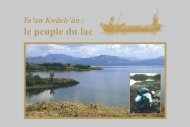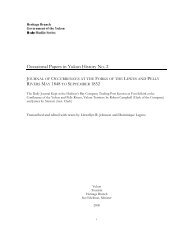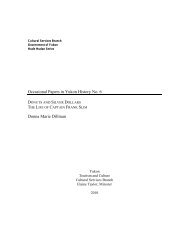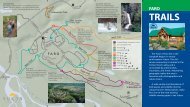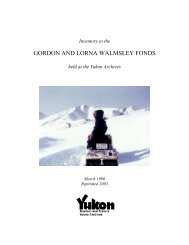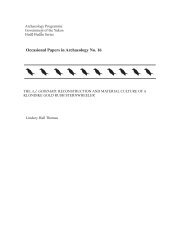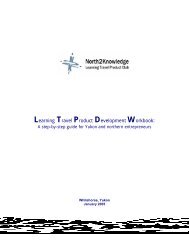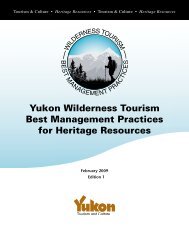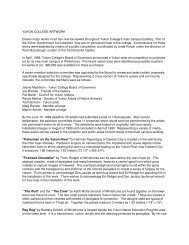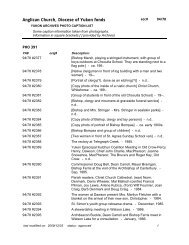Sustainable Tourism: The Tour Operators' Contribution
Sustainable Tourism: The Tour Operators' Contribution
Sustainable Tourism: The Tour Operators' Contribution
Create successful ePaper yourself
Turn your PDF publications into a flip-book with our unique Google optimized e-Paper software.
5. Customer Relations<br />
<strong>The</strong> handbook section on sustainable tourism is supplemented with a large selection of posters and other<br />
information on whales, birds, penguins and other animals, and on the Guidelines. <strong>The</strong> official training<br />
material for HLK tour guides on Antarctic cruises is based on the Guidelines, briefings, slide shows and<br />
the Antarctic Instruction book for Officers, Expedition Leaders and Cruise Staff.<br />
Benefits<br />
An important benefit of using the handbook is an increased understanding and respect among tourists<br />
for the fragile environment of the Antarctic. For HLK, the handbook is a good advertisement for the high<br />
standard of its cruises and helps the company achieve its aim of making its passengers ambassadors to<br />
the last still largely unexplored continent.<br />
Comments<br />
Based on the success of its Antarctica handbook, the company has also developed handbooks for<br />
travellers to the Arctic and for its Amazon River Cruises.<br />
2<br />
Box 1: Handbook for Polar Travellers: Behaviour and Instructions<br />
Behaviour<br />
We regard appropriate behaviour and attitude as a part of your equipment. Please overcome your sense of<br />
individuality and remain attached to your group at all times. We ask you not to go on any extra tours all by<br />
yourself and not to undertake any independent initiatives, especially when you are on glaciers. Falling into<br />
glacier crevasses is one of the most frequent causes of death in polar regions. Our staff and experienced<br />
tour assistants will show you the most environmentally friendly paths on site. Please obey their instructions.<br />
Never approach even harmless animals closer than five metres. Warnings from the tour assistants<br />
accompanying you, and who always keep the landing area under surveillance, are to be taken seriously. <strong>The</strong><br />
driver is responsible for the zodiac; only he is authorised to permit each voyager to rise or stand up.<br />
If the ship’s siren blows several times, this means there is an alarm situation. Every passenger should then<br />
return to the assembly point immediately in order to reach the ship as fast as possible. Smoking is prohibited<br />
in shore boats and in nature reserves. We should not leave litter behind – all we should take home are<br />
memories and photographs. We never visit stations without prior invitation.<br />
Instructions for travellers to Antarctica<br />
1. For reasons of animal protection and your own personal safety, keep the following distances from animals:<br />
• penguins, 5 m<br />
• breeding albatrosses, 5 m<br />
• breeding giant petrels, terns and skuas, 15 m<br />
• fur seals, 15 m (for your safety from aggressive bulls)<br />
• elephant seals, 5 m (never step between the animals and shore, in case animals panic and attack).<br />
2. Be careful when you are moving on land.<br />
3. Never stand between an animal and water, and never stand between young animals and their parents.<br />
4. Never cross the outer boundary of a colony of penguins or seals.<br />
5. Never touch the animals.<br />
6. Never alarm an animal in order to take a photograph.<br />
7. Keep as quiet as possible in order not to frighten the animals.<br />
8. Do not step on sensitive mosses and lichens.<br />
9. Do not take anything home from Antarctica except memories and photographs.<br />
10. Bring back all litter to be disposed of on the ship.<br />
11. Do not take food with you on land.<br />
12. Enter research stations only when invited to do so.<br />
13. Entrance to historical huts is permitted only in the company of an officially authorized person.<br />
14. Smoking is strictly prohibited on land, as well as in huts and shelters of historical importance.<br />
15. When on land, always remain with the group or leader of the expedition.<br />
16. Please follow the instructions given by your expedition leaders, lecturers and biology experts<br />
<strong>Sustainable</strong> <strong><strong>Tour</strong>ism</strong>: <strong>The</strong> <strong>Tour</strong> Operators’ <strong>Contribution</strong>




